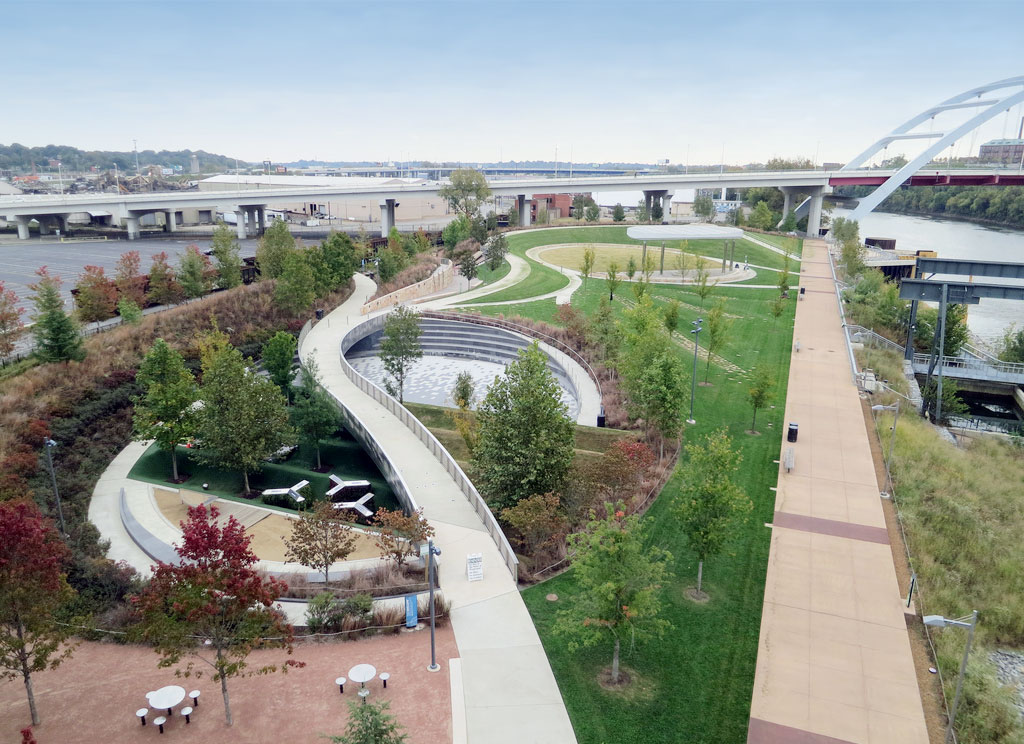
Cumberland Park in Nashville. Photo in the public domain, courtesy of Daquella Manera.
Nashville’s Metro Parks department oversees 12,000 acres of open space, including 108 parks and 19 greenways that help connect all those green spaces to one another. The parks system includes almost everything your recreational heart might desire, including dog parks, swimming pools, tennis courts, walking trails, horseback riding, golf, disc golf, and spray parks, which are appreciated during the hot Tennessee summers. An interactive map on the Metro website allows you to search for parks by geographic location or activity.× Centennial Park is home to one of Nashville’s three official dog parks, as well as marked running trails, bicycle rental stations, children’s play areas, and almost anything else you can expect from a park.Nashville’s best city park, Centennial Park (2500 West End Ave., 615/862-8424, daily sunrise-11pm, free) is best known as home of the Parthenon, and that edifice is the center of activity in this 132-acre gem. In addition to the museum and historical site, the park is also a pleasant place to relax. A small lake provides a habitat for ducks and other water creatures; paved walking trails are popular for walking during nice weather. The park hosts many events during the year, including Shakespeare in the Park each August and September. There’s almost always something going on here, particularly in the summer, when live music frequently fills the trees. Centennial Park is home to one of Nashville’s three official dog parks, as well as marked running trails, bicycle rental stations, children’s play areas, and almost anything else you can expect from a park.The 6.5-acre Cumberland Park (592 S. 1st St., 615/862-8508, daily sunrise-sunset, free) is one of Nashville’s newest, and if you count by the number of times it has been featured on ABC’s TV show Nashville, the most popular. TV drama aside, this is a remarkable space, nestled on the banks of the Cumberland River, next to LP Field. It includes a kid-friendly rock-climbing wall, trails with native plants, misting stations, and educational information about how the Cumberland River is essential to the area’s ecosystem. There are nice public restrooms and a concession stand here. The regular free parking is not available when there is an event at LP Field.
The largest city parks in Tennessee, Edwin and Percy Warner Parks (7311 Highway 100, 615/352-6299, daily sunrise-sunset, free) are a 2,600-acre oasis of forest, fields, and quiet pathways located just nine miles southwest from downtown Nashville. Nashvillians come here to walk, jog, ride bikes and horses, and much more. The parks have scenic drives, picnic facilities, playgrounds, cross-country running trails, an equestrian center, bridle trails, a model-airplane field, and athletic fields. Percy Warner Park is also home to the Harpeth Hills Golf Course, and Edwin Warner Park has a nature center that provides year-round environmental education. The nature center also hands out maps and other information about the park.
Most of the access areas on Percy Priest Lake are managed by the Corps of Engineers, but Metro Nashville operates Hamilton Creek Park (2901 Bell Rd., 615/862-8472, daily sunrise-sunset, free) on its western shore. There’s a sailboat marina here, where locals dock their boats, and this is a pretty spot from which to watch regattas and other sailing events. Storage for boats and paddleboards is available at a nominal fee for locals.
Excerpted from the First Edition of Moon Nashville.